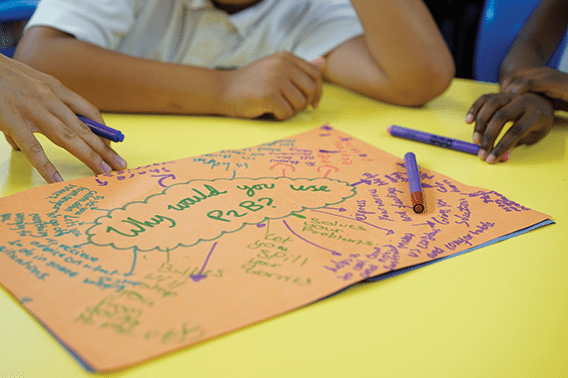
PEN speaks to the chief executive of Place2Be, Catherine Roche, about ensuring health, safety and wellbeing for future generations.
In December 2017 the UK government’s education and health departments published ‘Transforming Children and Young People’s Mental Health: a Green Paper’ to address the widening gap between mental health services for adults and children. Whilst these services are becoming more and more strained in the country’s devolving parliamentary system, they appear also to be failing the young people who need it most.
Children’s mental health networks and services are of increasing importance, and Place2Be is one of the national UK charities that provide emotional support to schoolchildren. With these services showing an increasing demand, the cost of a lack of mental health support is becoming more evident to these charities, who report how ‘children suffer, costs to taxpayers rise and society loses the potential of another individual’. Here the chief executive of Place2Be, Catherine Roche, shares with Pan European Networks the necessary steps to ensure the health, safety and wellbeing of these children and young people.
The UK government announced a £215m (~€244m) pilot to fund mental health teams within schools, with no specified date of nationwide roll-out. What approach could be adopted in the meantime to ensure that children who do not benefit from the scheme still receive support in the coming years?
Many UK schools are already going above and beyond to support pupils’ mental health. Some use their own budget to employ mental health professionals, others provide extra training for staff, and some work with voluntary sector organisations like Place2Be to implement a ‘whole school approach’ to mental health, supporting pupils, families and school staff.
Schools can play a crucial role: creating a culture of openness, identifying potential problems early, and providing support in a familiar environment without the stigma often attached to other mental health services.
The challenge is that not all schools are able to access the support they need – we know from our research, in partnership with the National Association of Head Teachers,1 that a lack of funding is one of the most common barriers to providing mental health support (77%), followed by a lack of services and qualified professionals locally (61%).
We currently provide training and clinical placements to over 1,000 child counsellors each year, with the aim of building a high-quality, experienced mental health workforce that schools can access. However, without proper resources schools outside of the UK government’s trailblazer areas could struggle to provide professional support for pupils. What is more, schools cannot manage the growing pressure of children’s mental health issues alone – they need to be backed up by properly resourced specialist services for onward referrals within Child and Adolescent Mental Health Services (CAMHS).
How do the needs of children differ from those of adults?
One of the key differences is the way that children and young people communicate – it’s not necessarily all about talking. Place2Be works with children, in some cases as young as five or six, and uses art and play to allow children to explore their thoughts and feelings in a way that is most comfortable for them.
Over time, and in a comfortable and safe space, the child is able to open up, for instance, through their art or role play. As a result, they can better understand and cope with their feelings. This has a huge impact on both their school and home life – 84% of parents said they felt their child’s problems were better after Place2Be’s one-to-one support.
According to the green paper, a new four-week waiting process is also to be phased in. Is this soon enough for children and adolescents in need of immediate attention, and what would be a more preferable waiting time for the near future?
Place2Be’s school-based mental health professionals aim to help schools to build close links with local CAMHS in order to make sure that any referrals are well-managed for the children and young people involved and that the end-to-end system is integrated. Therefore, a four-week waiting time would be a big step forward – according to research by the Education Policy Institute (September 2017), the average waiting time in 2016-17 was 33 days for assessment and 56 days for treatment. In an ideal world, specialist CAMHS would work hand-in-hand with school-based mental health professionals and voluntary sector organisations like Place2Be to ensure the child or young person is supported while they are waiting for their treatment.
Where will the priorities of mental health network members such as Place2Be be focused in supporting children during this transitional process?
We are looking forward to submitting a response to the government’s green paper, sharing our experience gathered over the past 23 years. It’s crucial that the UK government draws on the valuable experience of the voluntary sector and others who have been working in this field for many years.
Our Mental Health Champions programme for school leaders will continue to enable schools outside of the trailblazer areas to take a strategic approach to mental health, and our in-school services will continue to ensure that children and young people can access vital support when and where they need it. We will also continue to provide training and clinical placements to over 1,000 child counsellors each year, making a significant contribution to the skilled mental health professional workforce that schools can access.
We will continue to champion the role of schools in supporting mental health, and our belief that only when health services and education work together, can children and young people get access to the joined-up support they need.
Our ambition is for all schools to be able to access high-quality mental support for their pupils, and this focus will continue during this transition period and beyond.
Reference
- Survey of 813 primary school leaders, February 2016
Place2Be is a UK-based children’s mental health charity providing in-school support and expert training to improve the emotional wellbeing of pupils, families, teachers and school staff. Find out more at www.place2be.org.uk
Catherine Roche
Chief Executive
Place2Be
This article will appear in Pan European Networks: Government 24, which will be published in January, 2018.























